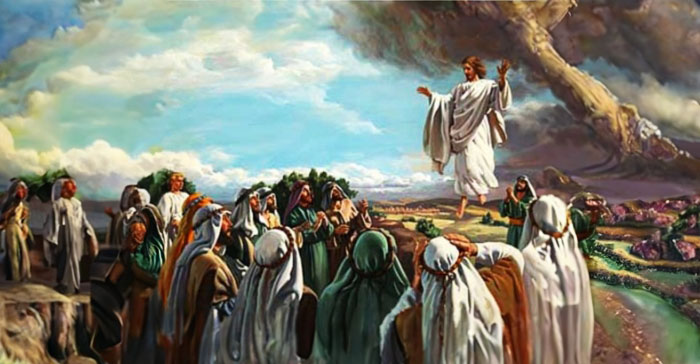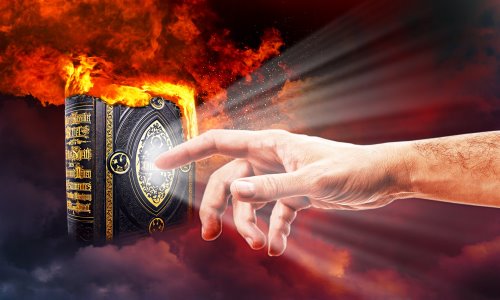
Matthew 28:19-20
Go ye therefore, and teach all nations, baptizing them in the name
of the Father, and of the Son, and of the Holy Ghost: Teaching them
to observe all things whatsoever I have commanded you:
and, lo, I am with you alway, even unto the end of the world.
Doug wrote:
How do you reconcile Paul saying that part of the mystery is Jew and Gentile being one in Christ? Also, the call was to the Jew first, then the Gentile? Paul always went first to the synagogues to preach. I'm not disagreeing with your points made at all, but trying to see how this all fits together. In addition, are you saying that the great commission is not for the Church today because it is in Matthew? This was a command to the disciples of that day and all succeeding generations of believers for our call is to preach the Gospel (yes, Paul's Gospel 1 Cor. 15:1-4) and to then bring them to maturity (Col. 1:28).
I'm having trouble reconciling every aspect of what you are saying. Please help clarify.
Doug
Dear Doug,
Those who value dispensational truth often have a problem with the so-called Great Commission of Matt. 28:19-20, for it seems to conflict with the commission given by the Lord Jesus to the twelve apostles in Matt. 10:
"These twelve Jesus sent forth, and commanded them, saying, Go not into the way of the Gentiles (the nations), and into any city of the Samaritans enter ye not: but go rather to the lost sheep of the house of Israel" (Matt. 10:5-6),
and this was in line with His own ministry, for to a Gentile woman He said,
"I am not sent but unto the lost sheep of the house of Israel" (Matt. 15:24).
The Lord restricted His earthly ministry to Israel and also that of the Twelve Apostles. However, after His Resurrection, He appeared to contradict this to the same apostles:
"Then the eleven disciples went away into Galilee. . . and Jesus came and spake to them, saying, All power is given unto Me in heaven and in earth. Go ye therefore, and teach all nations (Gentiles), baptizing them in the name of the Father, and of the Son, and of the Holy Ghost: teaching them to observe all things whatsoever I have commanded you: and lo, I am with you always, even unto the end of the world (age). Amen" (Matthew 28:16-20).
It is quite clear that now their ministry was greatly enlarged to embrace all nations, but what was the reason for this? Many interpret it as the future gathering of the church, but in the Scriptures that follow, this is shown to be wrong. The Body of Christ at this time was still a secret "hidden in God" (Eph. 3:1-11; Col. 1:24-27), and what God hides no one can find until He chooses to reveal. He did this through Paul's Prison Epistles.
In the passage quoted in Matt. 28:19-20, the Lord Jesus speaks as the One having all the resources of heaven as well as earth at His command. This can mean nothing less than sovereignty in both spheres of heaven and earth. His authority and power in His earthly life had been great (Matt. 7:29; Matt. 11:27). Now it is boundless, and it is this fact that must be proclaimed the world over so that His Kingdom and authority may, at last, be realized.
The Gospel of Matthew commences with the restriction of His ministry and that of the disciples to Israel (Matt. 10:5-8; Matt. 15:23-24). In Mark's account, to the Gentile Syro-Phoenician woman, the Word of Christ was, "let the children first be filled" (Mark 7:26-27). The children were Israel; they were to have the message first, but not first and last, that is, for The Kingdom's message to be permanently restricted to them. Its worldwide extent is implicit in God's unconditional promise to Abraham that through his seed (posterity), all families of the earth would finally be blessed (Genesis 12:1-3).
In God's earthly Kingdom, He purposes redeemed Israel to be the channel of blessing to the whole world, and it was for this purpose alone that God planned to make them the premier nation of the earth, spiritually and temporally, for they were to be a priestly nation that could mediate God's truth (Deut. 7:6; Deut. 28:1, Deut. 28:13; Psa. 135:4; Psa. 147:19-20; Acts 13:46-47 and many other Scriptures). Israel was to be the divine agent God would use to make Himself known to all nations so that, at last, His Kingdom on earth could be established.
This also explains why there is stress on the word "world" in the Gospel of John (79 occurrences). It in no way contradicts the Lord's statement in Matt. 15:24, that His earthly ministry was to Israel. We must remember that the words of Christ recorded by John were part of this earthly ministry, and they must primarily be kept in this setting, and all of them must be studied with this in mind. Whether the dating of John's Gospel was early or late cannot alter this important fact. However late it was, it could not be revealing The Great Secret of Eph. 3 and Col. 1 concerning the Body of Christ, for that, was kept for Paul, the prisoner of Jesus Christ, to make known under the guidance of The Holy Spirit after Israel was laid aside in unbelief (Acts 28:28). It is in the Epistles to the Ephesians and Colossians we find the revelation of The Body of Christ, giving its calling, constitution, and Heavenly destiny.
In the O.T. and during the Lord's earthly ministry, Israel had alas forgotten that God's choice and purpose for them had the whole world in view. They looked at the Gentiles as "dogs"; therefore, the Lord Jesus emphasizes the word "world" as a corrective in His ministry to them, recorded in the Gospel of John, showing them that He had a wider purpose. The earthly Kingdom made known in The Gospels was the great Messianic Kingdom of the Old Testament prophets, and it was this Kingdom that the forerunner, John the Baptist, proclaimed, followed by the Lord Himself. It was already known, being revealed in its wondrous details in the O.T.
Thus it was that this Kingdom was described in the model Kingdom prayer, given by the Lord, "Thy will be done on earth as it is in heaven" (Matt. 6:9-13). Even when Israel had crucified her King and Redeemer, this purpose of God was not ended, for the period covered by the Acts followed in which Israel had another opportunity of repentance and turning back to God. The Jew was still first both for judgment and blessing (Rom. 1:16-17; Rom. 2:8-11). We find both Peter and Paul putting them first in their ministry. God's tremendous long-suffering had not run out, as Peter made clear in Acts 3:19-26. If they repented and turned back, their sins and opposition would be forgiven, and their King would be sent back to them again. The Kingdom was still "the restoration of all things, which God hath spoken by the mouth of all His holy prophets" (Acts 3:21). They had "foretold of these days" (Acts 3:24), and Israel was still "the children of the prophets, and of the covenant which God made with the fathers, saying unto Abraham, And in thy seed shall all families of the earth be blessed" (Acts 3:25).
The great implication of these most important verses has been missed by so many that we do not wonder at all the confusion of ideas about the Kingdom of God (The reader is directed to 'Kingdom And Church').
Prophecy makes it quite clear that, finally, many nations (Gentiles) are to be blessed with Israel (Zech. 2:10-13 and Isa. 19:23-25). Christ will then become King and Lord of the whole earth (Zech. 14:9). Once we keep this in mind, we shall be in a better position to understand the "great commission" of Matt. 28:18-20. We shall then be able to appreciate this ministry in its rightful God-given setting and avoid divorcing it from The Kingdom of Heaven, finally to be established on earth. It concerns discipling or teaching the Gentiles in every land and baptizing them in the name of the Father, the Son, and the Holy Spirit.
The water baptism of the Acts period was in The Name of Jesus Christ as the God-man, the great Mediator, and King. We find no single instance of, or reference to, baptism in which the Triune name of Father, Son, and Holy Spirit is employed. On the contrary, from the very first, only ten days after the injunction had been given, Peter is found (Acts 2:38) commanding all his hearers, including those of the dispersion (the diaspora), to be baptized in The Name of Jesus Christ. Acts 8:16, Acts 10:48, and Acts 19:5 are in accord, the formula being in or into the name of the Lord, or the Lord Jesus. In the last case, whether this refers to those who heard John or Paul or whether the baptism was that of John or Paul, the formula is the same. Rom. 6:3, "as many of us as were baptized into Christ Jesus." 1 Cor. 1:13-15; here, baptism "in the name of Paul" is clearly contrasted with baptism in the name of the Lord Jesus, or Christ Jesus, which must have been used as to Crispus, Gaius, and Stephanas.
In all the other places where the act of baptism is mentioned, directly or indirectly, the formula by implication is the same. These are: Acts 8:38, Acts 9:18, Acts 16:15, Acts 16:33, Acts 18:8, Acts 22:16. Yet on the other hand, there stands the definite command in Matt. 28:19-20, as to the discipling of THE NATIONS into the Triune name of the Father, Son, and Holy Spirit.
The "difficulty" is created by the non-observance of the injunction in 2 Tim. 2:15 as to "rightly dividing the word of truth." It comes by mixing up and thus confusing The "Mystery" concerning The Church of God during the "times of the Gentiles" with the ordinances and observances of the "times" of Messiah (Isa. 33:6), with which the command in Matt. 28:19-20 has clearly to do with the discipling of the nations AS NATIONS is expressly declared. It is the commission of the Jewish ministry at the end of this age. There is nothing corresponding to this form of baptism in any of the foregoing passages, all of which are connected with individuals or families. Inasmuch as The Mystery is The Great Secret which was "kept secret since the world began" (Rom. 16:25; Eph. 3:9; Col. 1:26), it follows logically that it must not be read into The Gospels.
The "discipling" work of Matt. 28:19-20 is national work: its object -- to bring all nations into blessing with Israel. It has nothing to do with the present dispensation and the "one baptism" (Eph. 4:5) of this dispensation. Matt. 28:19-20 takes up the proclamation of The Kingdom, left uncompleted in Matt. 10:5-15, after The Church has been called on high. Therefore, the baptism "in" or "into" the name of the Lord Jesus in Acts was the continuation of John's baptism for a while, i.e., during the transitional period of Acts until The Mystery was openly revealed and fully proclaimed. Then, the Baptism of Eph 4:5 supervened and still maintains.
To hold, as some do, that the disciples had "forgotten," or were "ignorant of," or else ignored" the express command of the Lord, is to charge those spirit-endowed men with either incompetence or insubordination! Peter and John, and the rest, must have known well the meaning and future reference of Matt. 28:19-20; and they knew of John's baptism also: but until "led on" into more of "all the Truth" by The Holy Spirit, and until the revelation of the secret concerning The Church which is His Body was declared, they continued to baptize, as John had done, into the name of the Lord Jesus.
This great commission is essentially one of teaching, and it must be one of the greatest teaching ministries of Scripture. To understand it in any measure, we must not only keep it to the setting given in Matthew's Gospel but also to the other Scriptures which pertain to it relating to the Messianic Kingdom.
Perhaps we have wondered how the knowledge of The Glory of the Lord will one day "cover the earth, as the waters cover the sea" (Isa. 11:9)? The commission given to the apostles in Matt. 28 is doubtless one of the means used by God as well as the ministry of redeemed and restored Israel during The Millennium. Even in the Acts period, the Lord Jesus commanded the eleven and said, "Ye shall be witnesses unto Me both in Jerusalem, and in all Judea, and in Samaria, and unto the uttermost part of the earth" (Acts 1:8, see also Luke 24:46-47). Jerusalem, in prophecy, is the geographical pivot of The Kingdom on earth, and the light and knowledge radiate from it worldwide. This is in accord with The Gospel of The Kingdom, which is also preached to all nations of the earth (Matt. 24:14).
The final words of the Lord Jesus before His ascension were:
"I am with you always, even unto the consummation of the age (literally)" (Matt.28:20).
Note the present tense "I am," not "I have been or will be." The Lord uses the prophetic perfect here to stress His constant presence and enabling. And "if God be for us, who can be against us?" (Rom. 8:31). Satan and the powers of darkness have been conquered forever by the victorious risen and ascended Lord, and He will finally reign forever and ever both on earth and in all regions of the heavens.
To sum up: we have seen that the great stress on the word "world" in John's Gospel, mankind in general, was to remind Israel of their responsibility that, through them, all families of the earth should be blessed. This does not mean that this Gospel is Jewish in the sense that it was addressed solely to Israel and was entirely about Israel. This is the province of Matthew's Gospel. John's parish, so to speak, is mankind as a whole, whether Jew or Gentile, and it has a basic message for each, namely everlasting life through faith in Christ alone which gives either of them new birth and freedom from condemnation (John 3:3; John 3:24). Without this new birth a man "cannot see the Kingdom of God," but with it, he can, for he is now "born of the Spirit" (John 3:8) and has this new life which is everlasting and now is linked with Christ by faith. If anyone is troubled by the word "water" in these verses, they should consult Dr. E. W. Bullinger's 'The Giver and His Gifts' pages 63-68, where he shows that the meaning is "spiritual water" by the figure Hendiadys. In this context is the precious message of John 3:16, which has been the means of salvation for millions in this present age.
God is using more than one way of bringing Gentile sinners to Himself in order to realize His earthly Kingdom. He is using the Gospel of John with its emphasis on "he that believeth in Me hath everlasting life." He will, later on, use The Gospel of The Kingdom to all the nations of the world (Matt. 24:14). He will also use redeemed Israel after His second Advent to be His witnesses `to the uttermost parts of the earth' (Luke.24:46-48; Acts 1:8), so at last, the time will come when "the kingdoms of this world are become the kingdoms of our Lord and of His Christ, and He shall reign for ever and ever" (Rev. 11:5). Then the Lord shall be not just the King of Israel, but "King over all the earth" (Zech. 14:9).
We hope this helps,
The Believers




























